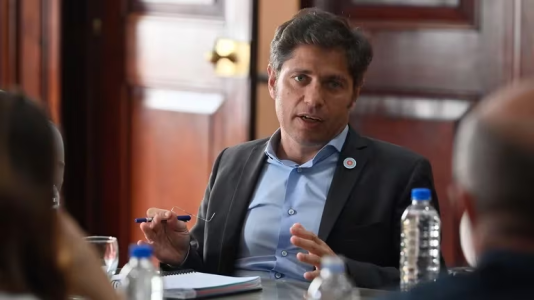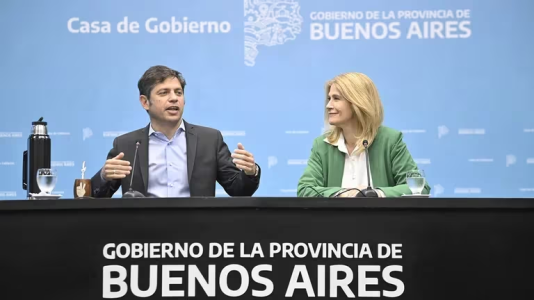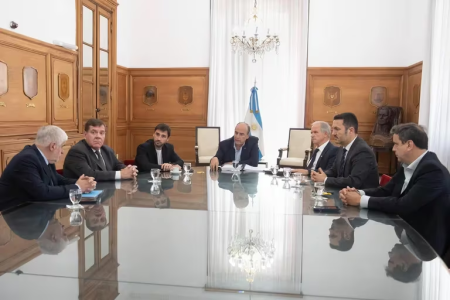Axel Kicillof will maintain his rejection of the Omnibus Law and monitors the impact in the province of Buenos Aires - Infobae

Source:

 www.infobae.com
www.infobae.com
January 29, 2024
Despite the negotiations that other governors maintain with the Casa Rosada, the Buenos Aires president does not change his position and focuses on how the rule will affect his district. Warning about delegated powers
By Doing Cottet

Axel Kicillof (PBA Government)
Despite the modifications and positions expressed by some governors of Juntos and the “dialogue” opposition regarding the debate on the Omnibus Law, the president of the province of Buenos Aires, Axel Kicillof , will maintain his rejection of the initiative that the Government will seek to discuss. this Wednesday in the Chamber of Deputies. Along with this discussion, these days Kicillof is focused on the impact that the points of the Base Law will have.
At the end of last week and without too many announcements, Kicillof gathered a group of mayors from the Buenos Aires suburbs at the Government House in La Plata. All Peronists. At that meeting it was agreed to systematically monitor the economic and social situation of the most populated districts of the country; detect sources of conflict and intervene in any episodes that may emerge. The mayors agreed that this month the demand for food in the municipalities and for work increased.
The mayors Julio Alak (La Plata), Jorge Ferraresi (Avellaneda), Mario Secco (Ensenada), Gustavo Menéndez (Merlo), Mariano Cascallares (Almirante Brown), Damián Selci (Hurlingham), Ariel sat down with Kicillof and part of his cabinet . Sujarchuk (Escobar); Mayra Mendoza (Quilmes) and Mariel Fernández (Moreno). It was agreed that a monitoring table had to be formed and that these types of meetings had to be regular and exchange information. In an official statement it was stated that “strong increases were verified in fuel, food, medicine and other items in the basic basket”; that “large increases in electricity, gas, water, train and bus tickets” are also expected in the coming weeks and that “this situation already seriously affects the middle and vulnerable sectors.”
This Monday, Kicillof brought together - also in La Plata - a group of small and medium-sized business entities to review and take stock of the situation in the sector. He was accompanied by his Minister of Production, Augusto Costa.
After the changes and the decision to eliminate the fiscal package from the original project of the Omnibus Law, the Buenos Aires government raised alarms due to the point of delegated powers that is still maintained in the latest text that the Milei government and that at this time are part of the key to the negotiation with the non-Kirchnerist opposition.
It was the Vice Governor of Buenos Aires, Verónica Magario , who described the expansion of delegated powers as “ the real risk of President Milei's proposal.”

Verónica Magario pointed out against the delegated powers of the Omnibus Law
“If this concession is voted, the government would be enabled to do, through decrees, everything that Parliament, also voted for by the Argentines, was not going to sanction, which could have motivated the “withdrawal” announced by Minister Caputo,” said the lieutenant governor. He also stressed that “it is necessary to emphasize the opposition to depriving the provinces of their genuine legal resources , much less the intention that this policy be deepened even further, something that he made clear in his announcement of the withdrawal of the fiscal chapter. the Minister of Economy .”
Since the beginning of the year, Kicillof has been holding meetings with sectors affected in different ways by the modifications that were proposed in the Omnibus Law and also in DNU 70/2023. In some crusades, the Buenos Aires native has found allies within the dialogue opposition.
The most effective case was to stop the changes in the Fisheries Law proposed by the original project of the Omnibus Law and which enabled foreign flag vessels to carry out the activity in national territory without having to disembark in Argentina. It also allowed the fishing authorization for personnel and vessels to be of any nationality. For the granting of fishing authorization, the current law prioritizes that the companies that operate are based in the country, that the vessels employ Argentine labor in a higher percentage and that the vessels are built in the country. The key to unlocking that point were the governor of Chubut, Ignacio Torres and the mayor of General Pueyrredón, Guillermo Montenegro ; both from PRO.
It may interest you:Miguel Ángel Pichetto: “If the Government does not follow a coalition path, it will have difficulties; "You can't function like this for 4 years."
Close to the Buenos Aires governor they said that it did not matter who achieved the objective . “If they listen to Torres, let him go and negotiate,” they argued. Something similar happened with the backward movement with the possibility of eliminating the so-called cold zone in the tariff reconstruction prepared by the national government.

The governor of Chubut, Ignacio Torres, together with the mayor of General Pueyrredón, Guillermo Montenegro, meeting with the Minister of the Interior, Guillermo Francos, for the Fishing Law
Among the latest changes is a clarification regarding the cold zone; which in the province of Buenos Aires directly impacts a total of 1,264,164 consumers in Buenos Aires territory, according to data from ENERGAS. This was the article that empowers the Executive to “modify, transform and/or eliminate the trust funds of the sector energy, including those destined for subsidies, reviewing their origin and destination, in order to guarantee greater effectiveness and efficiency in the allocation of the resources that comprise them and in the control at the time of their implementation and application. The cold zone regime was anchored on a trust fund. The new text of the Omnibus Law remains almost the same, except that it is clarified that “the SECRETARIAT OF ENERGY will take into consideration and understand the Cold Zone when designing, reallocating and establishing the new subsidy scheme, in order to avoid its duplication” . There were many political sectors that asked for changes in this matter.
In the province of Buenos Aires, the Buenos Aires infrastructure minister Gabriel Katopodis warned about this issue when he expressed his rejection at the public hearing for the increase in electricity; but they also did it from the UCR. The mayors of the south of Buenos Aires Sofía Gambier (Pellegrini), Lucía Gómez (Gonzáles Cháves), Martín Randazzo , (General La Madrid), Luciano Spinolo (Tres Lomas), Javier Andrés , (Adolfo Alsina) and Juan Carlos Chalde (Coronel Dorrego) also They had asked that the “Cold Zone” regime not be eliminated. The same position was exhibited last week by General Pueyrredón's Montenegro and the Peronist mayors of the southern area of Buenos Aires.

Source:

Axel Kicillof mantendrá su rechazo a la Ley Ómnibus y monitorea el impacto en la provincia de Buenos Aires
A pesar de las negociaciones que otros gobernadores mantienen con la Casa Rosada, el mandatario bonaerense no cambia su postura y se enfoca en cómo afectará la norma en su distrito. Advertencia sobre facultades delegadas
January 29, 2024
Despite the negotiations that other governors maintain with the Casa Rosada, the Buenos Aires president does not change his position and focuses on how the rule will affect his district. Warning about delegated powers
By Doing Cottet

Axel Kicillof (PBA Government)
Despite the modifications and positions expressed by some governors of Juntos and the “dialogue” opposition regarding the debate on the Omnibus Law, the president of the province of Buenos Aires, Axel Kicillof , will maintain his rejection of the initiative that the Government will seek to discuss. this Wednesday in the Chamber of Deputies. Along with this discussion, these days Kicillof is focused on the impact that the points of the Base Law will have.
At the end of last week and without too many announcements, Kicillof gathered a group of mayors from the Buenos Aires suburbs at the Government House in La Plata. All Peronists. At that meeting it was agreed to systematically monitor the economic and social situation of the most populated districts of the country; detect sources of conflict and intervene in any episodes that may emerge. The mayors agreed that this month the demand for food in the municipalities and for work increased.
The mayors Julio Alak (La Plata), Jorge Ferraresi (Avellaneda), Mario Secco (Ensenada), Gustavo Menéndez (Merlo), Mariano Cascallares (Almirante Brown), Damián Selci (Hurlingham), Ariel sat down with Kicillof and part of his cabinet . Sujarchuk (Escobar); Mayra Mendoza (Quilmes) and Mariel Fernández (Moreno). It was agreed that a monitoring table had to be formed and that these types of meetings had to be regular and exchange information. In an official statement it was stated that “strong increases were verified in fuel, food, medicine and other items in the basic basket”; that “large increases in electricity, gas, water, train and bus tickets” are also expected in the coming weeks and that “this situation already seriously affects the middle and vulnerable sectors.”
This Monday, Kicillof brought together - also in La Plata - a group of small and medium-sized business entities to review and take stock of the situation in the sector. He was accompanied by his Minister of Production, Augusto Costa.
After the changes and the decision to eliminate the fiscal package from the original project of the Omnibus Law, the Buenos Aires government raised alarms due to the point of delegated powers that is still maintained in the latest text that the Milei government and that at this time are part of the key to the negotiation with the non-Kirchnerist opposition.
It was the Vice Governor of Buenos Aires, Verónica Magario , who described the expansion of delegated powers as “ the real risk of President Milei's proposal.”

Verónica Magario pointed out against the delegated powers of the Omnibus Law
“If this concession is voted, the government would be enabled to do, through decrees, everything that Parliament, also voted for by the Argentines, was not going to sanction, which could have motivated the “withdrawal” announced by Minister Caputo,” said the lieutenant governor. He also stressed that “it is necessary to emphasize the opposition to depriving the provinces of their genuine legal resources , much less the intention that this policy be deepened even further, something that he made clear in his announcement of the withdrawal of the fiscal chapter. the Minister of Economy .”
Since the beginning of the year, Kicillof has been holding meetings with sectors affected in different ways by the modifications that were proposed in the Omnibus Law and also in DNU 70/2023. In some crusades, the Buenos Aires native has found allies within the dialogue opposition.
The most effective case was to stop the changes in the Fisheries Law proposed by the original project of the Omnibus Law and which enabled foreign flag vessels to carry out the activity in national territory without having to disembark in Argentina. It also allowed the fishing authorization for personnel and vessels to be of any nationality. For the granting of fishing authorization, the current law prioritizes that the companies that operate are based in the country, that the vessels employ Argentine labor in a higher percentage and that the vessels are built in the country. The key to unlocking that point were the governor of Chubut, Ignacio Torres and the mayor of General Pueyrredón, Guillermo Montenegro ; both from PRO.
It may interest you:Miguel Ángel Pichetto: “If the Government does not follow a coalition path, it will have difficulties; "You can't function like this for 4 years."
Close to the Buenos Aires governor they said that it did not matter who achieved the objective . “If they listen to Torres, let him go and negotiate,” they argued. Something similar happened with the backward movement with the possibility of eliminating the so-called cold zone in the tariff reconstruction prepared by the national government.

The governor of Chubut, Ignacio Torres, together with the mayor of General Pueyrredón, Guillermo Montenegro, meeting with the Minister of the Interior, Guillermo Francos, for the Fishing Law
Among the latest changes is a clarification regarding the cold zone; which in the province of Buenos Aires directly impacts a total of 1,264,164 consumers in Buenos Aires territory, according to data from ENERGAS. This was the article that empowers the Executive to “modify, transform and/or eliminate the trust funds of the sector energy, including those destined for subsidies, reviewing their origin and destination, in order to guarantee greater effectiveness and efficiency in the allocation of the resources that comprise them and in the control at the time of their implementation and application. The cold zone regime was anchored on a trust fund. The new text of the Omnibus Law remains almost the same, except that it is clarified that “the SECRETARIAT OF ENERGY will take into consideration and understand the Cold Zone when designing, reallocating and establishing the new subsidy scheme, in order to avoid its duplication” . There were many political sectors that asked for changes in this matter.
In the province of Buenos Aires, the Buenos Aires infrastructure minister Gabriel Katopodis warned about this issue when he expressed his rejection at the public hearing for the increase in electricity; but they also did it from the UCR. The mayors of the south of Buenos Aires Sofía Gambier (Pellegrini), Lucía Gómez (Gonzáles Cháves), Martín Randazzo , (General La Madrid), Luciano Spinolo (Tres Lomas), Javier Andrés , (Adolfo Alsina) and Juan Carlos Chalde (Coronel Dorrego) also They had asked that the “Cold Zone” regime not be eliminated. The same position was exhibited last week by General Pueyrredón's Montenegro and the Peronist mayors of the southern area of Buenos Aires.

